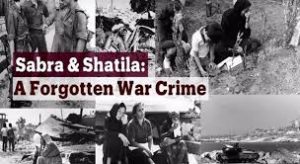 By Staff Writer
By Staff Writer
18:09:2021
Thursday, 16 September, marked the 39th anniversary of the Sabra and Shatila massacre, which saw around 3500 Palestinian refugees brutally killed by Lebanese Phalangist forces, supported by Israel.
“The victims were mainly women and children, many found in their own homes, their skirts above their waists, legs apart, having been raped before they were executed…. the bodies of dead children littered the streets like discarded dolls, bullet holes in the back of their heads.”
The UN General Assembly declared the insolent genocide in December that year, while the Israeli 1983 Kahan commission found Israel only ‘indirectly’ responsible, even though Israeli Defence Forces fired flares, enabling the attackers to visualise their targets, and blocked entries and exits of the camps to fleeing Palestinians. Israel had also been undertaking a bombing campaign in Beirut, which killed thousands of Lebanese.
Around 40 years later, the camps remained marred by dilapidation, poverty, and joblessness. Palestinian refugees living in Lebanon continue to face discrimination and not possessing rights for fear that they will impair their sectarian balance of power.
The Lebanese civil war was concluded with the Taif accords in 1989 and had caused the deaths of hundreds of thousands of Lebanese; however, the consociational governance system spawned by it survives, with Lebanon only recently appointing a government. Protests are common, and the Lebanese economy is currently in free fall.
Speaking to Radio Islam International, Tambisa Fakoude, Senior fellow at Africa Asia Dialogues, pointed out that the killings were also influenced by the assassination of Lebanese President Bachir Gemayel, who was a Phalangist commander. Further, he also noted that Shia was also targeted following Gemayel’s assassination.
Moreover, he focused on the Israeli Defence Minister Ariel Sharon’s notoriety, from heading the IDF in Sabra and Shatila and being nicknamed the ‘butcher of Beirut, to setting foot in the Al-Aqsa compound, something which was wise acknowledged to have heralded the start of the second Intifada. It is noteworthy that the Kahan commission bore him ‘personally responsible for the massacre in Sabra and Shatila; he was forced to relinquish his position of defence minister, but still managed to attain the position of Prime Minister years later.
Last, it was noted that events such as these need to be remembered, especially since contemporary stories are often beginning to take president.
It is noteworthy that Habib Shartouni, a Syrian Christian from the Syrian Socialist Party, later claimed responsibility for Gemayel’s murder, both Damascus and Tel Aviv played roles backing different forces in the 15-year Lebanese civil war. The massacres in Sabra and Shatila were also partially cited as giving rise to Hezbollah, whose inception was to protect Lebanese Shia and Palestinian refugees in Lebanon.
[LISTEN] to the podcast here







0 Comments